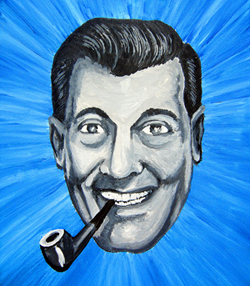You can find irony not only in single sentences and expressions, but also in events. Situational irony occurs when events turn out quite the opposite of what you may have predicted, as Thomas Foster explains in several places in his book How to Read Literature Like a Professor:
Your character crashes his car into a billboard but is unhurt because his seat belt functions as designed. Then, before he can get it off, the billboard teeters, topples, and crushes him.
Everything changes when irony climbs aboard. . . . Irony trumps everything.
Irony take[s] our expectations and upend[s] them, make[s] them work against us.
Edwin Arlington Robinson’s “Richard Cory” is an example of situational irony in poetry. Read the poem carefully and look for clues that show how the speakers referred to as "We people" perceive the title character’s situation. Remember that in situational irony, what appears to be true may not be.

Source: 20090704 – X-Day – GEDC0305 –
Wilhelm’s Bob Dobbs painting, ClintJCL, Flickr
Richard Cory
by Edwin Arlington Robinson
Whenever Richard Cory went down town,
We people on the pavement looked at him:
He was a gentleman from sole to crown,
Clean favored, and imperially slim.
And he was always quietly arrayed,
And he was always human when he talked;
But still he fluttered pulses when he said,
“Good-morning,” and he glittered when he walked.
And he was rich—yes, richer than a king—
And admirably schooled in every grace:
In fine, we thought that he was everything
To make us wish that we were in his place.
So on we worked, and waited for the light,
And went without the meat, and cursed the bread;
And Richard Cory, one calm summer night,
Went home and put a bullet through his head.

Answer the questions below to demonstrate your understanding of the irony in the above poem.
1. In the first stanza, Robinson emphasizes which characteristic of Richard Cory?
2. In the second stanza, Robinson emphasizes another characteristic of Richard Cory that doesn’t anticipate this character’s violent end. What is it?
3. To “the people on the pavement,” Richard Cory’s life seems ideal and sets up expectations that are an important part of this poem’s irony. The poet illustrates their envy in which of the following lines?
“Good-morning,” and he glittered when he walked.
To make us wish that we were in his place.
4. In contrast to Cory’s ideal life, the “people” suffer on a daily basis. The poet illustrates this in which of the following lines?
“Good morning,”
He was a gentleman from sole to crown,
5. Robinson makes the point that, despite his good looks, fame, and wealth, Richard Cory is suffering, too. The poet illustrates this in which of the following lines?
And he was always human when he talked;
Went home and put a bullet through his head.
Clean favored, and imperially slim.
Cory’s suicide was unforeseen by the people who thought he had everything they wanted. Cory’s demise comes as a surprise to the reader, too. Remember that with irony, if what happens is unexpected by the reader, situational irony is present.